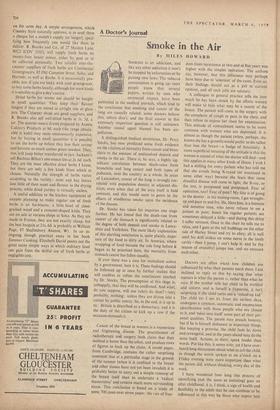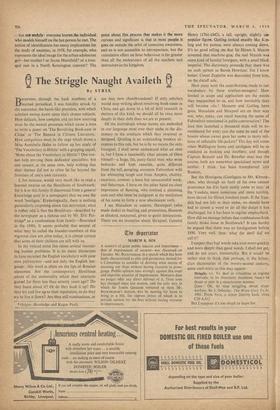A Doctor's Journal
Smoke in the Air
By MILES HOWARD A distinguished medical statistician, Dr. Percy Stocks, has now produced some fresh evidence on the relationof mortality from cancer and bron- chitis to the amount of undissolved deposit and smoke in the air. There is, he says, a highly sig- nificant correlation between death-rates from bronchitis and lung cancer and both types of pollution, over the country as a whole. In areas of Lancashire, cancer of the lung is strongly cor- related with population density in adjacent dis- tricts, even when that of the area itself is held constant, and this would seem to point to the effects of windborne smoke upon the incidence of the disease.
Dr. Stocks has taken his inquiries one stage further. He has found that the death-rate from cancer of the stomach is significantly related to the degree of both deposit and smoke in Lanca- shire and Yorkshire. The most likely-explanation of this startling conclusion is, quite plainly, expo- sure of the food to dirty air. In America, where wrapping of food became the rule long before it began to be practised here, the mortality from stomach cancer has fallen steadily.
If ever there was a case for immediate action by a government, here it is. These findings should be followed up at once by further studies that will confirm or refute the conclusions reached by Dr. Stocks. The presumption at this stage is, unhappily, that they will be confirmed. And what, do you suppose, will our rulers do then?—very probably, nothing: unless they are driven into a corner by public outcry. So, in the end, it is up to us : Britain is described as a democracy, and it is the duty of the citizen to kick up a row if the occasion demands it.
Cancer of the breast in women .is a mysterious and frightening disease. The practitioners of radiotherapy and surgery both claim that their method is better than the other, and produce rows of figures to back up the claim. A recent paper, from Cambridge, contains the rather surprising comment that at a particular stage in the growth of the tumour (when it is confined to the breast and other tissues have not yet been invaded) it is probably better to carry out a simple removal of the breast itself than to undertake a 'radical mastectomy' and remove much more surrounding tissue. This conclusion is based on a study of some 700 cases over seven years : the rate of free- dom from recurrence at two and at five years was higher with the simpler operation. The authors say, however, that this difference may perhaps have been due to 'selection' of the cases. Even so, their findings should act as a jolt to current opinion, and all such jolts are salutary.
A colleague in general practice tells me how much he has been struck by the efforts women will make to hide what may be a cancer of the breast. The patient will come to the surgery with the complaint of cough or pain in the chest, and then refuse to expose her chest for examination. This attitude of concealment seems to be more common with women who are depressed. It is almost as though the patient (when, perhaps, she knows she has a growth) would prefer to die rather than lose the breast—a badge of femininity. A more superficial meaning of the attitude is that the woman is scared of what the doctor will find—and this applies in many other kinds of illness. I wish I had a shilling for every patient who has told me that she avoids being X-rayed (or examined in some other way) because she fears that some dreadful disease will come to light; the X-ray, or the test, is postponed and postponed. Fear of operation, too? Fear of pain? My fear is of going to the dentist : in his waiting-room, I get wrought- up and pace to and fro. He, bless him, is a humane and sensitive man, who never refuses to see a patient in pain; hence his regular patients are sometimes delayed a little—and during this delay I suffer torment. Once in the chair he tells me to relax, and I gaze at the tall buildings on the other side of Harley Street and try to obey; all is well until his drill strikes on some nerve in the tooth cavity—then I jump, I can't help it; and he (by reason of empathy) jumps too, and we reassure each other.
,•
Doctors are often asked how children are influenced by what their parents teach them. I am inclined to reply to this by saying that what matters is what the parent is, rather than what he says. If the mother tells her child to be truthful and sincere, and is herself a hypocrite, it isn't surprising if the child turns out a 'mixed-up kid.' The child (as I see it), from the earliest days, undergoes a constant, automatic and unconscious identification with those people who are closest to it, and 'takes into itself' some part of their per- sonal qualities. The parent may preach honesty, but if he is himself dishonest in important things, like keeping a promise, the child feels let down .and revengeful, and in the years ahead may do the same itself. Actions, in short, speak louder than words. Put like this, it seems trite; yet I have over- heard long discussions about what to tell the child, as though the words spoken at six o'clock on a Friday evening were more important than what the parent did, without thinking, every day of the week.
have wondered how long this process of identifying (not the same as imitating) goes on after childhood; it is, I think, a sign of health and flexibility in the adult that he can continue to be influenced in this way by those who inspire him —but not unduly: everyone knows the individual who models himself on the last person he met. The notion of identification has many implications for the study of societies; in 1958, for example, who represents the ideal image for the urban adolescent .girl—her mother? or Jayne Mansfield? or a tran- quil nun in a North Kensington convent? The point about this process that makes it the more curious and significant is that in most people it goes on outside the orbit of conscious awareness, and so is not accessible to introspection; but the cumulative effect on later behaviour is far greater than all the endeavours of all the teachers and instructors in the kingdom.



































 Previous page
Previous page